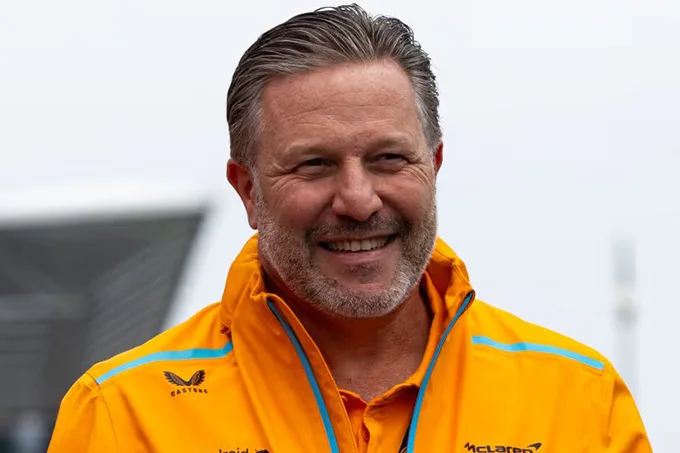Zak Brown reveals McLaren F1’s internal toxicity, fueled by conspiracy theories and mismanagement, during the turbulent post-Ron Dennis transition.
But in what state did Zak Brown find McLaren F1 upon his arrival?
The American painted a bleak picture of the final years of the Ron Dennis era in Woking.
In 2016, Zak Brown revealed that “conspiracy theories” had spread within the team — even reaching him.
The atmosphere was clearly deemed “toxic” by the American executive.
“It was much worse than I expected,” Zak Brown admitted on the James Allen Podcast when describing his initial reaction upon joining McLaren F1 in 2016.
“I arrived knowing things weren’t going well. You could see it in the lack of sponsors on the car, and you could see it in the results.”
“But once I was there, I realized just how bad it really was, and I had never led a Formula 1 team before. I had been immersed in Formula 1 my whole life.”
“I was used to an organization of that size—we had about 1,200 to 1,300 people at the PR agency I came from—so scale wasn’t an issue, but the departments and areas of expertise were mostly outside my comfort zone.”
“I first tackled the commercial side, as it was where I felt most comfortable, and we needed a lot of resources, so I knew that would be my biggest short-term contribution.”
“I ended up changing most of the leadership team, but one by one, as I got to know everyone. It took time to get things back on track.”
“The atmosphere was quite toxic on the ground, with internal politics and, as Andrea [Stella, team principal] calls them, the poisoned cookies. There were a lot of poisoned cookies going around.”
Zak Brown confirms that the struggles of the Honda power unit served as a smokescreen for McLaren F1, which refused to acknowledge that the team’s structural issues were rooted in Woking, not Japan.
“At the time, we were all convinced that the problem was with the Honda power unit.”
“And while that was a major factor, it wasn’t the only issue, and that became very clear once we switched to a Renault customer engine in 2018 and saw only slight improvements.”
“But we knew we had fundamental problems, so it was quite a daunting task to tackle, but we eventually got there.”
Even after Ron Dennis left, the toxic atmosphere didn’t disappear overnight. Zak Brown himself became a victim of it.
“We have about 1,300 people in total at McLaren Racing, with around 1,000 in Formula 1, so those with the most influence over the majority are the middle management level, which probably touches 600 people within the organization.”
“It’s easy to give a PowerPoint presentation and say, ‘Here’s what we want to be,’ but you have to put those principles into action and ensure they filter throughout the entire organization.”
Zak Brown decided to take control of the situation and implement change. But once again, internal resistance was strong.
“We were extremely transparent with our team, eliminating all internal politics.”
“I remember three guys from the gearbox department came to see me and said, ‘We’re really worried for you.’”
“I replied, ‘Why?’”
“I won’t name names, but they had seen three people talking and [told me], ‘It’s not good, we think they’re talking about you.’”
“I asked, ‘What did you hear?’”
“‘Nothing, but we think it was bad.’”
“That’s the kind of conspiracy theories that were circulating on the ground. People were seeing ghosts, and conspiracy theories were spreading across the team.”
“So, we eradicated that and implemented total transparency, with a no-blame culture.”
A no-blame culture: the key to success?
It’s this culture, avoiding finger-pointing, that explains the much-improved atmosphere now prevailing at McLaren F1. And, of course, the results followed, as McLaren has returned to the top tier of Formula 1.
“It’s so easy in this sport—and very frustrating—that when someone makes a mistake, whether it’s the driver, strategy, tires, or mechanics, people get upset with them, and it’s very damaging,” Zak Brown continues.
“We win and lose together; it’s a collective effort, so I think it’s been very beneficial for the team that the last few races have been really tough for us.”
“Qatar was tough for us; Brazil didn’t go our way; and in Vegas, we weren’t competitive.”
“So, just when everyone thought it was all wrapped up—we had strung together 14 consecutive podiums—we had three bad races right before the final round.”
“Seeing the team respond with a two-second pit stop at the critical moment in Abu Dhabi showed the team’s incredible resilience.”
Zak Brown concludes with optimism:
“I think we’ll be strong this year.”
- Discover More>Mick Schumacher: F1 Dream Lives On, Focus Shifts to WEC
- Follow us on >Facebook and >Twitter for F1 updates
Zak Brown’s McLaren Shock: Toxic Culture, Conspiracies, Change Zak Brown’s McLaren Shock: Toxic Culture, Conspiracies, Change
